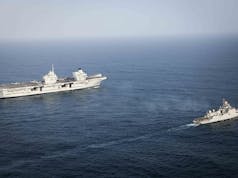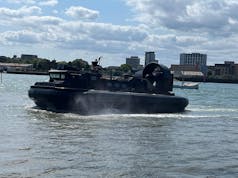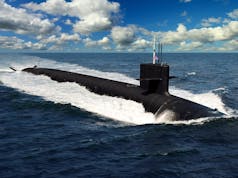In a written statement to Parliament, Defence Secretary John Healey provided a an update on the ongoing progress within the AUKUS strategic partnership, highlighting key advancements in defence trade and nuclear submarine development.
The AUKUS alliance, involving the United Kingdom, the United States, and Australia, was described by Healey as a “groundbreaking strategic defence and security partnership” that underscores the UK’s enduring commitment to the security of the Indo-Pacific region.
One of the most notable achievements Healey announced was the reform of defence export controls among AUKUS nations. On 16 August 2024, the UK government introduced the AUKUS Nations Open General Licence, a significant regulatory change aimed at streamlining defence trade among the three partners.
Healey referred to this development as a “historic breakthrough in defence trade collaboration”, explaining that the move, in combination with exemptions from the US International Traffic in Arms Regulations (ITAR) and adjustments in Australia’s export framework, will “significantly ease our licensing requirements for the export and sharing of certain defence products”.
He spoke of the economic benefits of these changes, noting that “these changes alone will support up to £500 million in UK defence exports each year, generating billions of dollars of trade across all three nations.” Healey also pointed out that this will create new jobs and bolster economic growth in communities across the UK, driven by improved cooperation between scientists, engineers, and defence industries within the AUKUS nations.
Progress has also been made on Australia’s acquisition of nuclear-powered submarines, a key component of the AUKUS agreement. On 5 August 2024, the three nations signed a Trilateral Agreement on Cooperation Related to Naval Nuclear Propulsion, facilitating the exchange of nuclear propulsion technology and enabling the future transfer of materials and equipment to Australia. This agreement, according to Healey, “reaffirms and is consistent with partners’ respective non-proliferation commitments,” ensuring that cooperation “continues to be undertaken in a way that is fully consistent with our international obligations and sets the highest non-proliferation standard.”
Further illustrating the progress made within AUKUS, Healey pointed to the Submarine Tendered Maintenance Period at HMAS Stirling in Australia, which began on 23 August 2024. This initiative marks the first time that Australian personnel, supported by a US Submarine Tender and observed by Royal Navy officers, have participated in the maintenance of a nuclear-powered submarine. The training and cooperation are intended to prepare Australia for operating and maintaining its future conventionally armed, nuclear-powered submarine fleet.
To ensure that the UK maximises the strategic and economic benefits of AUKUS, Sir Stephen Lovegrove has been appointed as the UK Government’s AUKUS Adviser. Lovegrove, who has previously served as Permanent Secretary at the Ministry of Defence and National Security Adviser, has been tasked with assessing the UK’s progress on AUKUS goals. His findings will help identify any existing barriers to success and outline new opportunities. According to Healey, “the AUKUS report will be completed rapidly and will set out any existing barriers to success alongside areas of opportunity the UK could be taking advantage of.”
Healey concluded his statement by reaffirming the government’s commitment to the partnership: “AUKUS is the most significant defence, security, and diplomatic arrangement the UK has entered in the past 60 years… this Government is fully committed to this national endeavour: working with partners, stakeholders and industry to achieve the maximum economic and security benefits possible, while upholding stability, peace, and prosperity in the Indo-Pacific region and beyond.”














Assuming we plan to go back to permanently having an SSN in the Indian Ocean then basing one or two SSN’s in Perth could actually see an improvement in the RN fleet saving on transit time. 5 boats should be able to carry out the North Atlantic tasking. Obviously much will depend on what maintenance facilities are available in Perth and the cost of using them however the Aussies are planning to spend $4 billion on the dry dock and attached facilities which suggest it could be substantial. Working on British SSN’s should be invaluable experience for Australia as well.
Shame we don’t have a submarine tender anymore…Dilly would be very useful now…yet another critical capability that was removed…
There was a comment made on here( or Navy lookout) that the cost of RFA Diligence had to come from the submarine services budget and they didn’t want to pay
I suspect the submarine service budget was a bit stretched saying for all the new dock upgrades and base upgrades…
Dilly wouldn’t have helped with the current mess so I can understand why that happened but it still isn’t good not having a tender for quick, at sea, repairs.
Valid point, but perhaps a future commercial purchase of another RFA Diligence type vessel could be considered if/when MoD budget is increased to 2.5% of:GDP? Hope springs eternal. 🤞
Diligence spent most of her recent time in the Gulf prior to retirement, so clearly wasn’t seen as that vital to sub ops (UK SSN rarely if ever went into the Gulf).
She was cheap, and a decent capability as a forward repair ship…but she wasn’t a full sub tender.
Even the US only has 2 Sub tenders left and they’re aging (40 years old). The Emory S Land spends most of her time tied up alongside in Guam due to the lack of land facilities, her sister ship was mainly tied up at Charleston.
To be a really useful Sub tender, rather than absolute bare bones like Diligence could be, you need far more repair shops, stores, the ability to repair, store and load weapons…and crucially for nuclear subs….you need to be able to produce copious quantities of electricity and steam to pipe to the sub when alongside…
We’re not going to get that….another ex-Oil services vessel like Diligence is possible, but it’s a bare bones capability for subs, useful for heavy repair though.
Maybe there’s mileage in an AUKUS sub tender? A resource jointly funded and manned between its members, in a similar vein to NATO E-3 Sentry’s etc?
agreed. there👍
the Australians have been exploring the loan of two retired Virginia class subs from the Americans. id offer the next Trafalgar to retire to give them the opportunity to learn how to operate 3SSN in return, it would be a good thing to take the Collins SSK in return they’re technologically up to date, only use small crews and would bolster the fleet.nhst to change 5 subject for a moment can towed Arrays from retired boats be removed and fitted into the surface fleet? the array on t5 Trafalgar class is still one of the best out there. it would be a shame not use them somewhere else. same with kit from the retired T23 DSd 30MM’S
mm, torpedoes and gun.
Morning Andy, Aust should be keeping all the subs it has got, even have a mixed fleet, as it’s a big patrol area down here and out west and up north. The UK could buy into the Norwegian German diesel sub program for a small fleet of 4 and have commonality and everyone is already aneighbour! Might help the UK get the Norwegian T26 order too! And if that happens it might be wise for the UK to get 1-2 more T26s if the price comes down further. Help get the fleet up to 20+.
Would be nice to give them a T boat but I think they will be completely knackerd once we are done with them.
Hmmm. As a non-diving training boat a T might still be useful though. Maybe.
They won’t be retired Virginia Class subs, they’llbe transferred as operational boats to the RAN.
The oldest Virginia is 20 years old…
The last Trafalgar Class is 33 years old and on her last legs….the class entered service 41 years ago…
Gifting the Australian’s a Trafalgar would probably put them off the idea of nuclear subs…
Towed arrays for subs are different than surface ones…we have enough S2087 to go around (we have 11 seagoing sets but only 8 vessels planned to have it…)
Let’s see what happens if Canada joins in as talked about in the news. That will will give us 4 eyes out of 5.
Canada could perform the critical function of training all the DEI officers, and repeatedly drilling them in Arctic maneuvers in whaleboats.
Don’t kid yourself into believing Canada will ever spend the money to build nuclear submarines. You have a far better chance of Ireland joining NATO than that happening.
They are probably hoping to freeload some of the development offsets though. ‘We’ll build xyz in Canada to help the effort” 🙄
The US is not keen at all on Canada having SSN believe it or not….AUKUS appears to be a one time only deal for Australia only…
You’d think it would make sense and be a valuable reinforcement for them, but no…
The suspicion is that Canada having SSN would mean that they suddenly became far more aware of USN sub movements in Canadian waters that are currently invisible…
The U.S. will be the dominant partner (sic) here. It would never have signed up to the pact if that was made clear from the beginning – most likely in secret codicils to the treaty. This is the U.S.N.’s creature – if it materialises – lest we forget.
Maybe we can use Aussie naval personnel to get our Astutes back to sea.
No better familiarisation and training on SSNs than that…